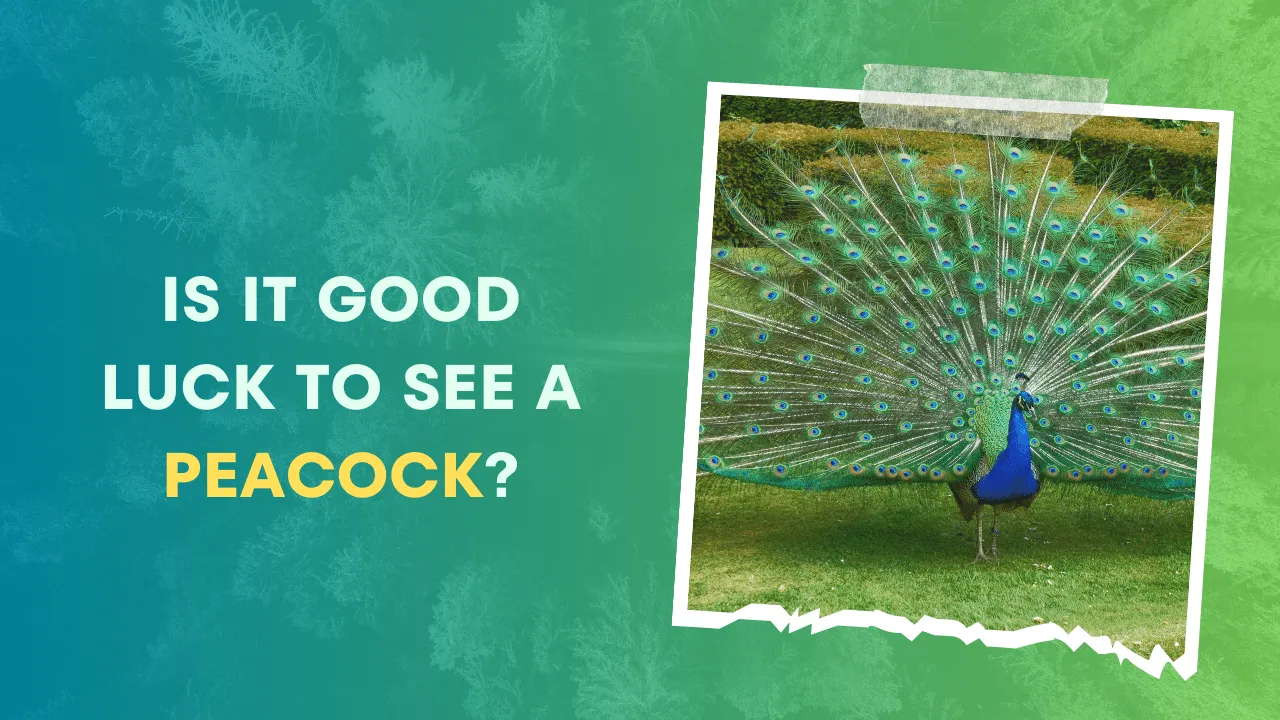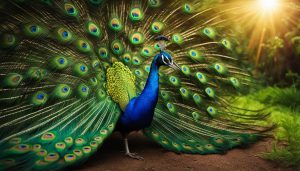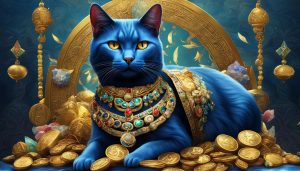The peacock, with its mesmerizing blue and green iridescent plumage, is a treat to the eyes and carries centuries of myths, beliefs, and cultural significance.
Different cultures perceive the peacock differently, but many associate it with favorable omens. This article delves deep into the associations of the peacock with good luck and the roots of such beliefs.
Contents
- 1 The Peacock in Different Cultures:
- 2 Some Superstitions about Peacocks:
- 3 The Psychology of Good Luck and Peacock Sighting:
- 4 Is it Good Luck to See a Peacock?
- 5 Conclusion
- 6 FAQs
- 6.1 Why do some cultures believe that peacocks bring good luck?
- 6.2 Are any cultures that view peacocks negatively or as a sign of bad luck?
- 6.3 Can keeping a peacock feather at home bring good luck?
- 6.4 Are there specific times or situations when seeing a peacock is especially lucky?
- 6.5 Does the gender of the peacock (peacock vs. peahen) affect its association with luck?
The Peacock in Different Cultures:
The peacock has graced the lands of India and Southeast Asia with its beauty and charm for centuries. However, its reputation is not restricted to its native lands. Worldwide, cultures have embraced and revered the peacock for its symbolic significance.
Hinduism:
The peacock finds a special place within the vast tapestry of Hindu myths and legends. The god Krishna, an avatar of Vishnu and a central figure in Hinduism, is often illustrated with a peacock feather, symbolizing his connection with beauty, grace, and royalty.
Buddhism:
The teachings of Buddhism see the peacock as a manifestation of compassion, wisdom, and the journey to enlightenment. Its vibrant feathers reflect the colors of life and the path to understanding one’s existence.
Christianity:
Christian traditions imbue the peacock with themes of resurrection and rebirth. The bird’s capability to shed its old feathers and sprout new ones resonates with the themes of death and rebirth central to the religion.
Greek Mythology:
In ancient Greece, the peacock was the bird of Hera, the queen of the gods. While it symbolized pride and vanity, it also stood for the watchful eyes of the ever-present goddess.
Chinese Culture:
Reverberating prosperity and fortune, the peacock in Chinese lore is also a symbol of the yang principle, embodying the masculine energies of the universe.
Some Superstitions about Peacocks:
The enchanting appearance of the peacock has given rise to numerous superstitions. Its rare and captivating sight is often linked to moments of good fortune:
- A chance encounter with a peacock is believed to usher in good luck.
- A peacock unfurling its majestic tail promises prosperity.
- Discovering a peacock feather can be seen as an omen of protection and fortune.
- Keeping a peacock feather indoors might invite prosperity and well-being.
- Dreaming of this spectacular bird often foretells positive changes.
Also read: Is it Good Luck to See a Hawk?
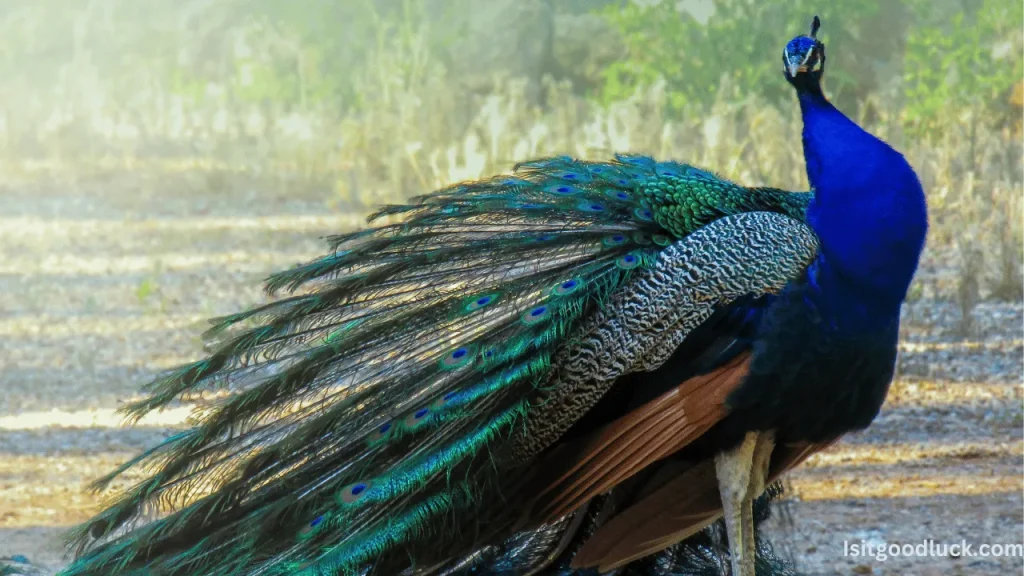
The Psychology of Good Luck and Peacock Sighting:
The feeling of uncertainty on spotting a peacock is not merely rooted in age-old beliefs but can also be explained through the lens of psychology.
When we encounter a peacock, its striking appearance often evokes a sense of wonder and admiration. Such beautiful and visually pleasing experiences trigger the release of dopamine, the ‘feel-good’ neurotransmitter, in our brains.
This dopamine rush leaves us with a heightened sense of happiness and positivity. Over time, and across various instances, our brains may start associating this surge of positive emotion with the sight of the peacock, leading us to believe that encountering one is a harbinger of good luck.
Moreover, the rarity and exotic nature of the peacock play a role in our psychological response. When humans come across something rare or unusual, it stands out, creating a memorable imprint on our minds.
This distinct impression, coupled with the positive emotions elicited by its beauty, further reinforces the belief that sighting a peacock brings fortune.
Furthermore, cultural narratives and shared beliefs also play a significant role. When stories, myths, and cultural practices repeatedly affirm a specific faith, it becomes a collective truth for communities.
Sharing their anecdotes of good luck following a peacock sighting strengthens the myth, making the association even more deeply rooted in societal consciousness.
Also read: Is it Good Luck to See a Cardinal Bird?
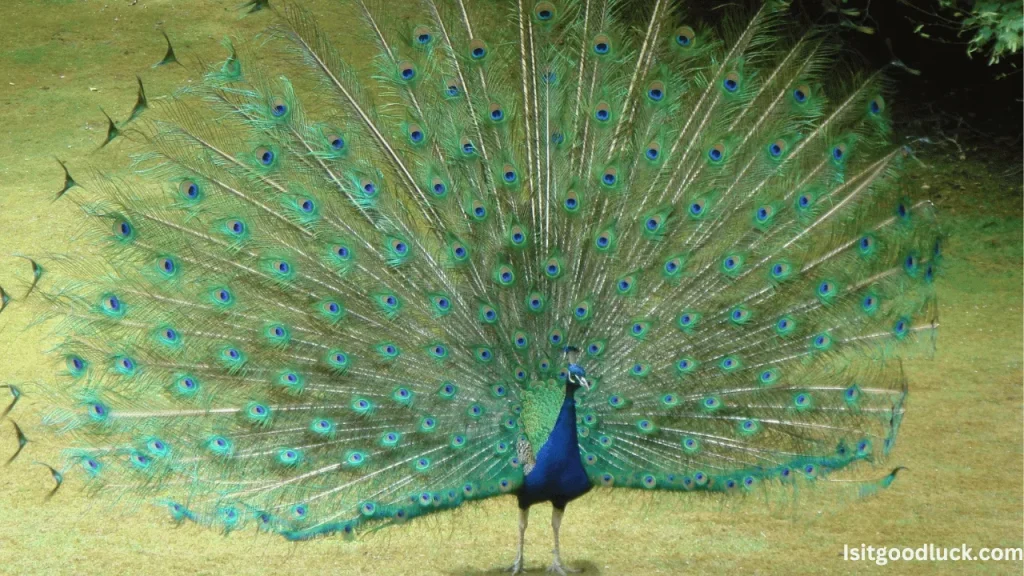
Is it Good Luck to See a Peacock?
There’s a certain magic in catching a glimpse of a peacock. With their intricate patterns and a spectrum of vibrant colors, peacocks stand out as one of the world’s most breathtaking birds.
Many believe their dazzling hues symbolize joy, happiness, and prosperity. It’s like nature’s way of painting a masterpiece, and when we witness it, we can’t help but feel a surge of positivity.
Beyond their striking appearance, peacocks hold a more profound spiritual significance in various cultures and religions. These birds often rub shoulders with deities and divine entities in myths and legends, lending them an aura of sacredness and divinity.
When one sees a peacock, it’s almost as if they’re getting a nod from the spiritual world, a sign that they’re on the right path.
Furthermore, peacocks are wild creatures that seamlessly blend with their natural surroundings. Their presence is a gentle reminder of the beauty and balance of nature.
To spot a peacock might suggest that we, too, are in a harmonious relationship with our environment, leading many to view such encounters as a fortunate omen.
Whether it’s their radiant beauty, spiritual connections, or ties to the natural world, peacocks have earned their reputation as harbingers of good luck. So, the next time you chance upon one, take a moment to appreciate the layers of meaning behind its mesmerizing display.
Conclusion
The question, “Is it good luck to see a peacock?” may never have a definitive answer that holds for everyone. Cultural contexts, personal beliefs, and individual experiences greatly influence one’s stance.
However, one thing remains undeniable: the peacock, with its regal demeanor and spectacular plumage, never fails to leave an indelible mark on the beholder.
Whether you believe in the good luck charm of the peacock or merely appreciate its innate beauty, an encounter with this bird is always special.
If you ever cross paths with this magnificent creature, take a moment to soak in its grandeur. And as legends would have it, who knows? Fortune might just be smiling down on you.
Also read other articles regarding birds good luck.
FAQs
Why do some cultures believe that peacocks bring good luck?
Many cultures believe peacocks bring good luck because of their association with deities and spiritual entities. For instance, in Hinduism, the peacock is linked with Lord Krishna, representing beauty and wisdom. Their radiant plumage, symbolizing prosperity and joy, also plays a role in such beliefs.
Are any cultures that view peacocks negatively or as a sign of bad luck?
While many cultures see peacocks as a symbol of good luck and prosperity, some beliefs consider the peacock, especially its feathers, as a sign of bad luck. For instance, in some Western traditions, peacock feathers inside a house are thought to bring bad luck or evil eyes.
Can keeping a peacock feather at home bring good luck?
While seeing a peacock is often considered a good omen, the belief about keeping its feather at home varies across cultures. In some cultures, possessing a peacock feather is believed to protect against negative energies and bring prosperity. In contrast, others believe that getting the feather indoors could invite misfortune.
Are there specific times or situations when seeing a peacock is especially lucky?
While seeing a peacock at any time can be considered lucky due to its general associations with good fortune, some believe that encountering a peacock during significant life events or changes—like starting a new job, moving to a new home, or embarking on a journey—might amplify the bird’s positive influence, signaling a smooth transition or success in one’s endeavors.
Does the gender of the peacock (peacock vs. peahen) affect its association with luck?
Typically, when people refer to ‘peacocks’ in the context of beauty and luck, they refer to the male bird, which has vibrant plumage. The female, or peahen, has a more muted coloration. However, in terms of luck or spiritual significance, no widespread belief differentiates the uncertainty brought by a peacock versus a peahen.

